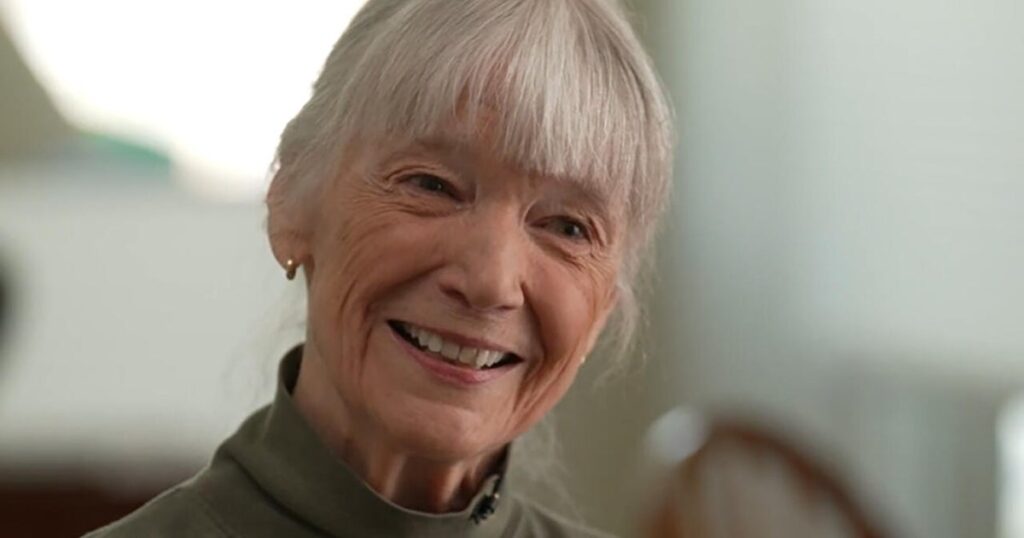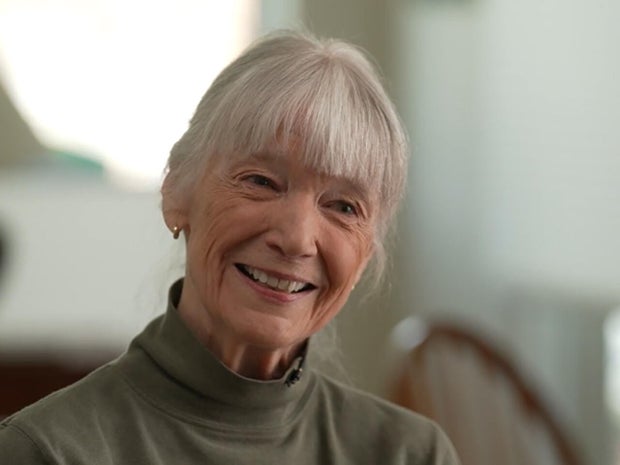Novelist Anne Tyler was once described as a writer who likes to break America’s heart. “Oh, dear! Well, don’t you think life kind of breaks your heart?” she said.
Stories about life breaking your heart, and how love can sometimes mend it, have made Tyler a Pulitzer Prize-winning novelist, and a best-selling author for six decades.
In 1977, she told The New York Times, “It does matter to me that I be considered a serious writer. …. A serious book is one that removes me to another life as I am reading it. … It has to be an extremely believable lie.”
“I don’t remember saying that, but I believe every word of it still!” she laughed. “The fact that it’s a lie is a very important part of what makes it not real life, don’t worry! And the fact that it’s a believable lie makes you say, I am actually being another person right now.”
The people who live in Tyler’s two dozen books have touched countless readers: “Dinner at the Homesick Restaurant,” “Breathing Lessons,” “A Spool of Blue Thread,” and “The Accidental Tourist,” which became a critically-acclaimed film with William Hurt as a travel writer who hates to travel, and Geena Davis, who won an Oscar for playing the woman who shows him that love is possible for those willing to take a chance.
CBS News
Tyler said, “What makes me keep going as a writer is a more selfish motive, which is, I’m just always wanting to know what it’s like to be somebody else. … I feel almost deprived that I have just this one life; I have to be greedy and reach out and see, Well, that guy I just passed in the street, he said that strang thing, what is it like to be him? It’s just self-indulgence to sit and write all day and pretend I’m somebody else.”
“I love listening to people”
Tyler grew up in a quiet Quaker community in North Carolina. She would tell herself stories to fall asleep at night: “I would fold my knees up and that would be my desk, and I would be a doctor seeing patients, and I would whisper these conversations. And it always ended with my brother in the bed across the room shouting out, ‘Mama, Anne’s whispering again!'”
Something her readers have long heard about, but never seen: her “blue box,” full of hand-written notes to herself. I asked, “Is it fun for you to page through the blue box and go, ‘Oh, I forgot I thought about that’?”
“Yes,” she said. “But we should never page through it too often, because then it won’t be surprising.”
CBS News
The box is filled with ideas and snippets of conversations overheard in grocery stores or coffee shops that she might slip into a book. “I love listening to people; I like to hear them nattering on,” she said. “That’s why the pandemic hit my writing career very hard! Because I love to just be walking down the street and you hear somebody say two words, as I go on, I think, I wonder what that was about? And that’s where stories begin.”
No place is more associated with Tyler than Baltimore, Maryland. It’s where she and her late husband, Iranian novelist and psychiatrist Taghi Modarressi, raised their two daughters.
So, why does she keep returning to Baltimore as a setting for her stories? “Laziness,” she mused.
“You seem to have a love for the setting,” I said.
“But face the fact that if I wrote about somebody in New York, I’d have to find out a bunch of things about New York,” Tyler said. “And here I am! But I don’t know why it is that I feel there’s sort of more there there in the average Baltimorean than there are in people in other places.”
“I’m going to be writing this [next] book forever”
Knopf
Tyler’s latest book, “Three Days in June,” details a long weekend in the life of a school administrator, bookended by the loss of her job and her daughter’s wedding. At one point the book’s main character, Gail, says, “I’m not the kind of woman who dreams of doing things.”
I asked Tyler, “If you could pretend to be anybody, why choose the assistant headmistress at a school in Baltimore, versus a movie star or a head of state?”
“You think that’s bad – the current thing I’m working on, the guy remodels kitchens for a living,” Tyler replied. “I don’t know! I’ve often asked myself, if I want to be somebody else, why not somebody heroic and crusading out in the world? But I don’t get to choose. I always say novels are like olives in one of those tall, thin bottles. You just get out an olive that’s on top. This is the one that comes next.”
But the lives of her characters, and the jobs they have, are anything but humdrum. “And there is a beauty in the acceptance that people have over their own lives,” I said. “Sometimes people just end up in a place like Baltimore.”
“They make a life there!” she laughed.
Now, at age 83, Anne Tyler says she’ll keep doing what she has always done: listen, think, and write about people who might shatter your heart, or stitch it back together.
Asked how many more books we might expect from her, Tyler replied, “Well, I’m going to be writing this [next] book forever, and when I finish it, if I do finish it before I die, I will rewrite it. And if I’m still not dead, I will rewrite it again, because I’m not going to bring out another book. I’m horrified that I have 25 books in a list in the front of this latest novel.”
“Isn’t that a joy, Anne? Twenty-five books?” I asked.
“No!” she said. “My next-door neighbor many years ago said, ‘You do churn them out, don’t you?'”
“That comment clearly lingers in your mind.”
“It’s engraved there, yes!” she laughed.
READ AN EXCERPT: “Three Days in June” by Anne Tyler
WEB EXCLUSIVE: Watch an extended interview with Anne Tyler
For more info:
Story produced by Ed Forgotson. Editor: Ed Givnish.
https://www.cbsnews.com/news/anne-tyler-on-a-writers-selfish-motive-to-explore-other-lives/



